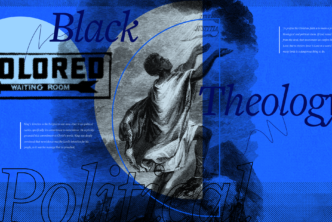This article was originally part of The Paul Page, a site dedicated to academic study of the apostle, with special focus on the work of N.T. Wright. Written by Wan Chee Keong.
If E.P. Sanders’ characterization of first century rabbinical Judaism as ‘covenantal nomism’, with its emphasis on ‘God’s goodness and generosity, his encouragement of repentance and offer of forgiveness’ is correct, as opposed to the traditional understanding, ‘through Lutheran spectacles’ (cf. James D.G. Dunn, ‘Jesus, Paul, and the Law’, p. 185), as ‘earning righteousness/salvation through good works’, then, according to Paul, what was wrong with Judaism? Did Luther misinterpret Paul?
‘Covenantal nomism’ excluded the Gentile from God’s covenant people; it was never legalistic. Fair enough. Dunn has highlighted the nationalistic/racial/Gentile-excluding nature of the Mosaic Covenant/Law; the gospel did threaten the ‘peculiar identity’ of Israel. The ‘curse’ of the Law in Galatians 3:10 was on those who failed to keep the Law in its entirety because it is impossible to do so; it was also on the Gentile because he cannot keep the Law at all — he does not have the Law! Although Philippians 3:6 and Luke 1:6; 2:25 show that it is possible to be ‘blameless (or righteous) according to the Law’, it is not a righteousness that can justify. It is not God’s righteousness, which alone can justify.
In terms of comprehensive scope, personal appeal, unconditional force and universal application, the Law was unrivalled in the world. Indeed ‘salvation is of the Jews’. Paul the Christian, however, found something amiss with the Mosaic Covenant/Law. Paul saw it as ‘strange/interim grace’, in the light of Jesus Messiah. (I owe the word ‘strange’ to C. F. Evans’ designation of Rom.13.4 as the ‘strange’ work of Christ.) It was inadequate grace. What was wrong with Judaism was, in rejecting Christ, it could only see the Mosaic Covenant/Law through a veil; it couldn’t see its strange and interim andinadequate nature.
In Gal. 4:21-30, Paul’s equation is Mosaic Covenant=Mt. Sinai=Hagar=present Jerusalem=slavery.Israel was called as God’s elect to prepare for the coming of Messiah. The Mosaic covenant wasinterim grace. The Jews are God’s elect only in principle. This is clear from Rom. 2:28, 29; 9:6-8. They had certain advantages (Rom. 3:2; 9:4, 5) but these only, as it were, prequalified them. In the final analysis, ‘both Jews and Greeks are under the power of sin’ (Rom.3:9).
The Jews had a zeal for God but ‘not according to knowledge’ (Rom.10:2). It was when Saul the Pharisee turned to the Lord on the road to Damascus that the veil was lifted and he saw the Mosaic Covenant/Law and Israel as the ‘elect’ as it really was (2 Cor. 3:14-16). ‘[T]he glory and greatness of Judaism’s covenant theology’ (Dunn, p. 187) is valid up to a point. To Paul, however, ‘what had glory in this case has no glory on account of the glory that surpasses it’ (2 Cor. 3:10).
The Law was God’s gift to Israel. It was an integral component of His covenant with Israel as His ‘elect’. It was not wrong per se that the Jews ‘boasted’ in God, ‘having in the Law the embodiment of knowledge and the truth.’ (Rom. 2:20). ‘The Law is holy and the commandment is holy and righteous and good’ (Rom. 7:12). There is, however, something amiss with the Law. The Law has its ‘ill’ effects. The Law excludes the Gentile; it shuts him out from the Covenant (Gal. 3:10)! It is‘strange’ grace.
J.W. Drane, an evangelical, views Galatians 3:19 as amounting to ‘a categorical denial of the divine origin of the Torah’ (Paul: Libertine or Legalist?’, p. 34), while H. Hübner sees it as meaning the Law ‘is the product of demonic angelic powers’ (pp. 24-36, ‘Law in Paul’s Thought’). These are extreme views. As I see it, Paul regards the Law, not as real/direct grace but virtual/indirect grace. How so?
On the one hand, it enslaves the Jew: it is a yoke (Gal.5:1; Acts 15:10). It condemns him (Rom.3:19; 2 Cor. 3:9); it ‘kills’ him (Rom. 7; 2 Cor. 3:6, 7). The Law brings about wrath (Rom. 4:15).
On the other hand, it separates mankind into two: Jew and Gentile, circumcised and uncircumcised. It shuts out the Gentile from the Abrahamic blessing and designates him a ‘sinner’ (Gal. 2:15; 4:17, 21-31; Eph. 2:11,12). The Law was our pedagogue, says Paul (Gal. 3:19). Whether we understand pedagogue as the confining and restricting regulations which separate Jew from Gentile (N.J. Young, ‘Paidagogos: the social setting of a Pauline metaphor’, pp.150-76), or as functioning in the guarding and protecting of Israel from the defiling idolatry of the Gentiles (T. D. Gordon, ‘A note on Paidagogos in Gal.3:24,25′), the implication is the same: the Law excludes the Gentile and enslaves the Jew.
The Law was not abrogated or nullified but fulfilled and taken up into the Law of Christ (1 Cor. 9:21). This explains why the righteousness of those who follow the Law of Christ successfully will exceed the righteousness of the devotees of the Law, the scribes and Pharisees. Although the Law is not ultimate or complete, it is absolute and eternal; it is therefore relevant to Christians as revelation.
‘The Law is holy and the commandment is holy and just and good’. In other words it is divine,absolute and eternal. But it has many disadvantages: it is not ultimate or all-encompassing (the Jews had to supplement it with the Talmud); it is not God’s principal or final Word (it ispreliminary/interim), and it excludes the Gentile!
With such a critique of the Mosaic Covenant/Law, occasioned by the nature of the gospel, no wonder Saul the Pharisee persecuted the early church and was subsequently persecuted himself. There is a modicum of truth in the accusation against Paul in Acts 21:28. Acts 21:21 is not true, of course, but Paul’s preaching did imply that. I doubt if he would have protested if Christian Jews stopped circumcising their children or walking according to the customs.
But Jesus the Messiah, He is ‘amazing’ grace! He is God’s eternal, absolute, ultimate, exhaustive, principal and final Word. Judaism kept the Law to maintain and demonstrate its status as God’s ‘elect’, not to ‘earn’ righteousness, but it is still ‘working’, still a matter of ‘works’. This is not God’s way. It is of the ‘flesh’. The gospel is a matter of repentance and grateful acceptance of God’s truegrace, a gift to be received. Scripture, God’s Word, says this: Galatians 3:11,12. Saul the Pharisee, Zacharias and Elizabeth, and Simeon may have been ‘blameless according to the Law’ but they were not justified. Only truly perfect righteousness can justify; and that means the ‘righteousness of God’, which is perfect (Rom.1:17; 3:21-26). As long as it is ‘works’, even if it is to ‘maintain’ one’s status as the ‘elect’, it implies merit. But God’s righteousness is a gift. It is ‘reckoned’ (logizesthai): shall we say ‘bestowed’? Romans 4:4 is decisive.
The way of ‘works’, whatever the motive, is putting the cart before the horse. It won’t work. God’s way is a matter of ‘being’; of letting the Spirit of Christ have His way in and through us. This works.
Luther was right after all: justification by grace through faith is an important part of the gospel. Rabbinical Judaism is one of ‘strange’ grace and ‘works’. It is ‘off’ because the Mosaic Covenant/Law itself is ‘off’, in the light of Jesus Messiah’s coming.
Raisanen is right in saying there are tensions (but not inconsistencies, as he maintains) in Paul’s understanding (Dunn, p. 215). Jew and Gentile, male and female: there is no difference in Christ (Gal.3:28). So are they all equal? Paul’s answer seems to be yes and no. The Jews possess some unique advantages: their ‘prequalifications’ (Rom.3:2; 9:4,5).
Paul condemned the ‘saboteurs’, the false brethren, who tried to get his Gentile converts into bondage under the Law — not rabbinical Judaism, not the unbelieving Jews. For the latter, Paul had ‘great sorrow and unceasing grief.





